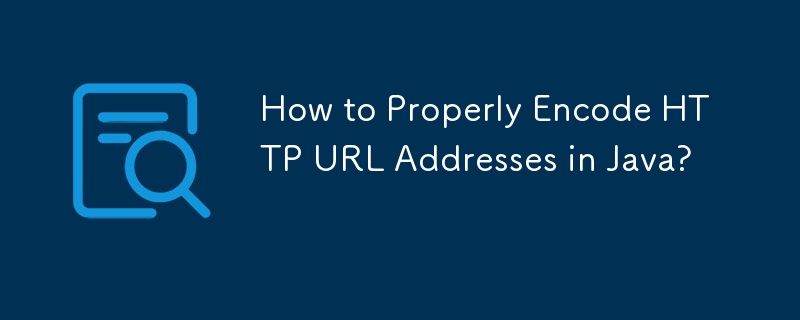

HTTP URL Address Encoding in Java
When working with Java standalone applications that interact with URLs, it is crucial to encode them properly to handle space characters and other potential issues. Java provides various methods to facilitate this process. One option is to utilize the java.net.URLEncoder class, which is designed for HTML form encoding. However, it may not always be suitable for HTTP URL encoding.
An alternative approach is to leverage the java.net.URI class, which offers more control over the encoding process. To encode an HTTP URL address correctly, create an instance of URI using multiple arguments:
URI uri = new URI(
"http",
"search.barnesandnoble.com",
"/booksearch/first book.pdf",
null);The resulting URI will have spaces replaced with " " characters, effectively encoding the URL address. Note that this method only escapes illegal characters and does not encode non-ASCII characters. To address this, use the toASCIIString method:
String request = uri.toASCIIString();
This will convert the URI to a string that contains only US-ASCII characters, ensuring compatibility with HTTP protocols.
For URLs with queries, such as https://www.example.com/path?param=value, you can use the five-parameter constructor of the URI class:
URI uri = new URI(
"https",
"www.example.com",
"/path",
"param=value",
null);Remember to use the toASCIIString method if the query string contains characters that need to be encoded. By utilizing these methods, you can effectively encode HTTP URL addresses in Java, ensuring proper operation in your applications.
The above is the detailed content of How to Properly Encode HTTP URL Addresses in Java?. For more information, please follow other related articles on the PHP Chinese website!
 pr shortcut key
pr shortcut key
 The difference between python courses and c+ courses
The difference between python courses and c+ courses
 Common website vulnerability detection methods
Common website vulnerability detection methods
 What are the gsm encryption algorithms?
What are the gsm encryption algorithms?
 What to do if your IP address is attacked
What to do if your IP address is attacked
 The difference between insertbefore and before
The difference between insertbefore and before
 What protocols does the ssl protocol include?
What protocols does the ssl protocol include?
 How to open xml file
How to open xml file




